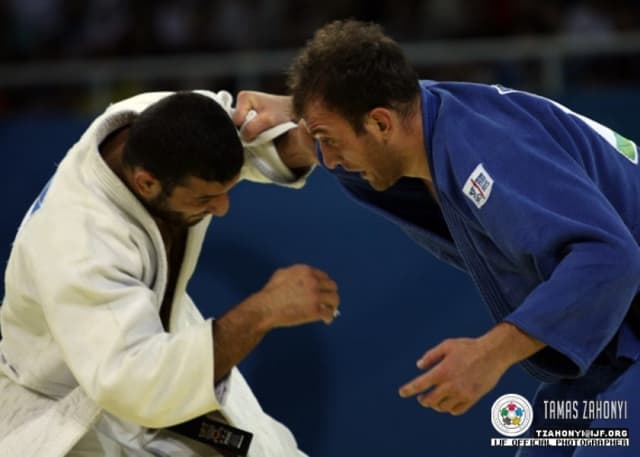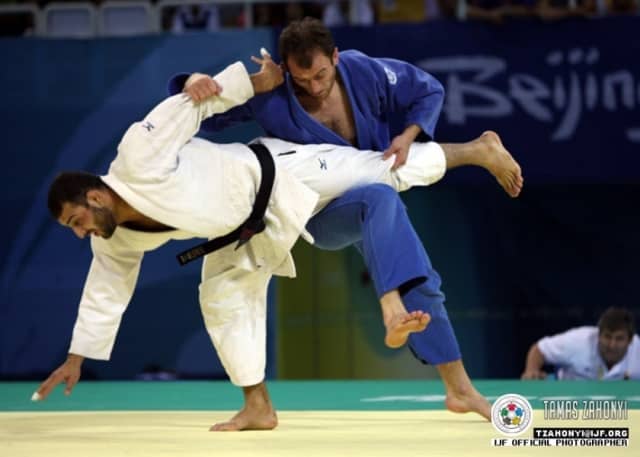We introduced the statistics, the almost impossible feat and the question in our first article in the series, which can be found here:
https://www.ijf.org/news/show/151-olympic-champions-tokyo-to-tokyo
A reminder of the question:
It could be said that to be in the company of an Olympic judo champion is to be presented with someone who has reached an absolute pinnacle, a ceiling which cannot be surpassed; there is nowhere further to ascend in the world of sport. We often find Olympic champions speaking with freedom and certainty, unafraid to share an opinion, speaking of their lives and journeys with confidence. For many we feel there is peace, and that can be magnetic and inspiring.
So the question is, did they become Olympic champion because of that character or did they become that person having won the Olympic gold medal?
“In judo, in Olympic sport in Georgia and in my city, Kutaisi, we already had an Olympic champion, Davit Khakhailishvili. He fought and won at +95kg in Barcelona but has now sadly passed. Because of him, the dream and goal of every child in Kutaisi was to become an Olympic champion.
Our coach helped us a lot, to make our dreams come true. He helped us to believe in ourselves. Every day was hard work, persistent hard work, just the same as I try to teach my students now. As a coach now, I try to transfer the same force we had when I was a sportsman. Being the hardest worker in the team, from all team mates, was motivation for me. I wanted to be the one working hardest and from that work I was able to believe that I could fulfil the goal. When that day came, the Olympic competition, it was this belief exactly which brought me the feeling that there was no way I would lose that day."
"I have examples; we had different kinds of exercises, such as running to time. Who was the best among us? I tried to be better than whoever was there. I was the best runner in my club because I wanted to be; I was highly competitive. Georgia is a mountainous country and we have a lot of unusual training like physical physical training in the mountains. In Bekauriani there are different excises such as climbing high hills. Sometimes I started slower than my team mates but from 100 times, I would reach the peak before them all 100 times. Realising I was first on each occasion gave me the belief that I was always making one more step towards the goal, each time, one more than anyone else. This accumulated."
"The main thing was that I had probably the best teacher, Omar Merabishvili. He had been Davit’s coach too. The team surrounding me, also our genes, the Georgian spirit, all these things contributed. We also have a national wrestling style in Georgia and judo is very similar to it. Having that base helped us to create a different judo style. After gaining experience in Georgian wrestling, when even a little child comes to the dojo, he already knows how to perform many judo throws. There is also a big and important history in judo in the country; the previous generations did a lot for us. All of this combined was enough for us to think that these huge goals were not impossible.
Before I reached the final in Beijing, I had four fights and I beat stronger opponents, on paper, in those fights than my final opponent. My opponent in the final was totally different from the others. I expected someone else, someone stronger and so I had even more confidence in myself. My mood was set by those previous fights and then out of nowhere the Algerian opponent, Omar Benikhlef (ALG), came and I didn’t expect him. I thought that it shouldn’t have been him in the final and that maybe it was a mistake. Those thoughts could have cost me the gold medal and of course the Algerian was very strong.”
Did the Olympic gold medal change you?
“Other people tell me it didn’t change me. I think I am the same person I have always been but my career never ended, I t’s kind of everlasting. This feeling came to me when I began coaching, transferring my knowledge to the next generation. Being among my friends and old team mates in the coaching staff and being involved in all this judo action makes my career continuous. We all trained together as sportsmen 20 years ago and we always talked about the future of judo in Georgia and how we can improve and contribute in the best way and as we grew up and became coaches or leaders within the federation, we had this opportunity to fulfil our ideas from when we were young."
"I have one funny story, a small thing that continues to feel good and remind me of what we achieved. Our national phone company offered us exclusive phone numbers when we came home from Beijing. I have kept mine to this day.”






